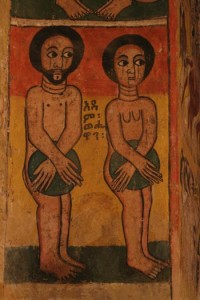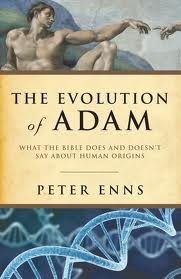The issue of the “historicity of Adam” (and Eve–why do we always forget Eve?) is becoming a flashpoint in evangelical theology. Books are being published, conferences are being held, and major money is being doled out by grant funders like Templeton to deepen the conversation and pursue theological solutions to the vexing questions. It’s no surprise that the issue is generating such interest. One one side, conservatives argue that if you lose a historical Adam and Eve, you lose–all at once–the weight of tradition, the authority of  Scripture, and the gospel itself. Without Adam, no sin. No sin, no need for a savior. On the other side, theistic evolutionists (or “evolutionary creationists”) argue that the conservatives force a false choice: you can affirm both science and Scripture (for all truth is God’s truth); you can affirm Scripture’s authority and interpret Genesis 1-3 in ways that do not require a historical Adam and Eve (or a literal six-day creation, for that matter). As N.T. Wright notes, the question is not “Is the Bible authoritative? but how is the Bible authoritative? Not is the Bible true? but how is it true? What is its truth about? This is an issue with no less force than that which Galileo and his opponents faced: Scripture or science? Here we are again (though Christianity has been “there” since Darwin).
Scripture, and the gospel itself. Without Adam, no sin. No sin, no need for a savior. On the other side, theistic evolutionists (or “evolutionary creationists”) argue that the conservatives force a false choice: you can affirm both science and Scripture (for all truth is God’s truth); you can affirm Scripture’s authority and interpret Genesis 1-3 in ways that do not require a historical Adam and Eve (or a literal six-day creation, for that matter). As N.T. Wright notes, the question is not “Is the Bible authoritative? but how is the Bible authoritative? Not is the Bible true? but how is it true? What is its truth about? This is an issue with no less force than that which Galileo and his opponents faced: Scripture or science? Here we are again (though Christianity has been “there” since Darwin).
For a great example of the state of the debate, read Peter Enns The Evolution of Adam and then read (or vice versa) Hans Madueme’s meticulously crafted review of Enns’ book. (To round it out, then read Enns’ response to Hans review). Hans is a friend and a former colleague of mine at Trinity Evangelical Divinity School. I admire his intellect and appreciate the care with which he engages this issue. He represents the “conservative” side outlined above. Hans is worried that the loss of a historical Adam will result in a major theology FAIL for the church and for the gospel. The Bible is either inerrant or it isn’t. If there are errors somewhere, then there could be errors everywhere–and how then would you know the difference? (The slippery slope is a common conservative evangelical anxiety and it’s an understandable one, given the relation between psychology and belief). He also wonders how, if you jettison Adam, can you theologically account for the reality of sin? And he concludes that when faced with a choice between science and the “dogmatic tradition,” he’ll choose dogma every time. (Enns astutely points out that, when that’s the default position, there’s not much point in discussing the issue further). He asks many more questions and raises some penetrating points, but this is a brief blog post so I’ll just add a few thoughts to the conversation.
At a recent conference on the question of origins, I heard a young earth (six-day) creationist, who is scientifically trained, proudly declare that what separates young earthers like him from the rest of the crowd is that, when science and Scripture come into conflict,  they go with Scripture every time. Of course, what he really means is that when science and their interpretation of Scripture conflict, they go with their interpretation of Scripture every time. So back to Madueme’s review of Enns: Why would someone who argues in a slippery slope way about the authority of Scripture stop at the historicity of Adam and Eve? (and maybe he doesn’t?) Surely the six days of Genesis 1 could be taken at plain face value, as the young earth creationists urge. In other words, the slippery slope argument loses its force if you’re not willing to go all the way. And if you are, you find yourself not only at odds with the scientific consensus (if you care about that), you’re also at odds with Scripture itself. For example, Genesis 1 and Genesis 2 are quite distinct creation accounts that cannot easily be reconciled with each other, at face value. Further, Genesis 1 contains within itself some elements that have to be explained in very strained (and strange) ways if you want a literalistic (scientific-historical) interpretation.
they go with Scripture every time. Of course, what he really means is that when science and their interpretation of Scripture conflict, they go with their interpretation of Scripture every time. So back to Madueme’s review of Enns: Why would someone who argues in a slippery slope way about the authority of Scripture stop at the historicity of Adam and Eve? (and maybe he doesn’t?) Surely the six days of Genesis 1 could be taken at plain face value, as the young earth creationists urge. In other words, the slippery slope argument loses its force if you’re not willing to go all the way. And if you are, you find yourself not only at odds with the scientific consensus (if you care about that), you’re also at odds with Scripture itself. For example, Genesis 1 and Genesis 2 are quite distinct creation accounts that cannot easily be reconciled with each other, at face value. Further, Genesis 1 contains within itself some elements that have to be explained in very strained (and strange) ways if you want a literalistic (scientific-historical) interpretation.
Moving on to the gospel issue: I simply do not feel the domino-effect in the notion that if you lose a historical Adam and Eve, you lose sin, and thus the need for a savior. To need a savior, you just need sin. Sin is an empirical reality. To repeat a reference from last week’s post, as Reinhold Niebuhr said, original sin is the only empirically verifiable Christian doctrine! Granted, “sin” is a theological category that requires divine revelation to know what it is, but I would think that had Genesis 3 and Romans 5 (and all references to Adam and Eve) been snipped from all our Bibles, we’d still have a pretty good understanding of what sin is, that it disrupts our relationships with God and others, and that we’re in dire need of redemption.
I affirm that sin has a historical (even “primal” basis). That is, I believe that there was a time when homo sapiens had emerged in their conscious lives–their awareness of the world and of God–and subsequently “fell.” Their reach exceeded their grasp and they perverted their proper place as creations of God. Kenneth Miller, in his persuasive book Finding Darwin’s God, suggests that a historical “fall” (quite apart from any “primal pair”) might even be supported by archeological data. For example, findings reveal a marked increase in violent, human-on-human death about 10,000 years ag. That’s an interesting suggestion–though it’s solely speculative–and as Miller acknowledges, it doesn’t alleviate challenges to the traditional view of the “fall” in light of scientific evidence. Science tells us death and suffering preceded human life (which raises the vexing “problem of evil” for theistic evolutionists–who is responsible for death?). In any case, theologically and biblically it is right to affirm that sin has a long history–and it has affected how people have related to each other, to God, and to our environment for thousands of years. We are now experiencing the snowball effect of sin’s influence: the “sins of the fathers (and mothers).” So yes, what Hans declares is true: “I am a son of Adam (and of Eve).” But it’s true in a figurative and theological way — “Adam” is humankind.
Original, or “inherited” sin is a root the refusal to be what we were (and are) intended to be: bearing the imago Dei in relationship with God and others. The story is the story of all of us. It is an ‘archetypal’ story. The theological message of the doctrine of original sin is more pressing (and I think more interesting) than discussions about its historicity and textual development. It’s canonical, it’s authoritative, and it’s true. And we don’t even need to know the mechanism that brought sin into being or the moment at which it emerged to appreciate its present reality.
If Adam and Eve stands for humanity in a theological (and archetypal) way, and if that’s what God as the ultimate author of Scripture intended to communicate to us, then we can feel the force of a need for a savior in Jesus Christ without recourse to a single, primal historical pair called Adam and Eve. We just need sin to need a savior.











